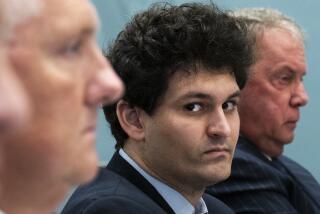Have We Been Giving Short Shrift to Loyalty?
- Share via
If you’ve been paying attention to the news, you’ve no doubt noticed that one virtue in particular has been taking a drubbing lately. To say the least, these have not been proud days for loyalty, and American Taliban John Walker Lindh is only one glaring example.
Enron, the “Mommie Dearest” of corporations, treated its employees like dupes in a con game. And some companies have no shame about squeezing localities for handouts in good times while shipping jobs overseas in bad.
According to a recent survey, fewer than half of the employees of American companies believe their employer merits loyalty. The mania for the better deal has become the Holy Grail of an era. Hot young MBAs jump from company to company with the fidelity of a lothario. Doctors and patients barely stay together long enough to get lab results back. Hey, even American spies aren’t what they used to be. Julius Rosenberg, remember, was at least a true believer in the cause of communism. What did Aldrich Ames and Robert Hanssen sell out for? Nothing but money, baby.
What’s going on here? Moral malaise? Mass commitment phobia? Or is it, as in the view of Robert P. Lawry, director of the Center for Professional Ethics at Case Western University, a generalized shallowness, a shared attention-deficit disorder that results in “this whole lack of stick-to-itiveness?”
No and no and no.
It’s far too simple to suggest that we’re not the men and women we were, that, for instance, we’re not worthy to occupy the same ecosystem as the Greatest Generation, supposedly the paragons of loyal behavior. Before we sell our own corner of eternity short on the loyalty meter, think no further back than Sept. 11 and the extraordinary acts of selflessness and devotion on that terrible day. “The premise of diminished loyalty has some appeal but is seriously flawed,” says J.F. Watts, dean of humanities and the arts at the City College of New York.
Look around, Watts notes; acts of loyalty are apparent everywhere. Does anyone believe parents today are any less self-sacrificing when it comes to their children? Are alumni less passionate about their colleges? Are citizens of New York--or many other locales--any less fervent about their city?
OK, so let’s accept that we’re still capable of loyalty. Great. Or is it great? If someone is described as “loyal,” the assumption is that a compliment has been made. But sometimes, loyalty is not all it’s cracked up to be.
Loyalty is one of our more complicated virtues. It cannot be evaluated without context, unlike, say, some of the other characteristics of the archetype Boy Scout. Like bravery. It’s hard to imagine how courage could be deemed anything but an unalloyed, positive attribute. Same with kindness. And when are courtesy, cheerfulness or cleanliness unwelcome?
But loyalty demands qualification. Loyalty to whom or to what? Didn’t those who herded the innocent into gas chambers regard themselves as loyal soldiers of National Socialism?
“The only thing that makes loyalty logical is a set of principles and the people and the institutions who embody those principles,” says Frederick Reichheld, a sort of guru of loyalty in the business world. “You don’t stay married to a spouse who beats you up every morning. That’s abuse. Unthinking loyalty to a leader who is cheating customers and investors, that makes no sense at all.”
But for the right cause, loyalty can be a ferocious incentive. Just ask the soldiers on whom the story of “Black Hawk Down” was based. They risked everything to rescue their comrades in Somalia. Less dramatically, Reichheld argues in his book “Loyalty Rules!” that loyalty--to customers and to employees--is the pathway to prosperity.
The companies thriving today, even in this sluggish economy, are those who elevate loyalty to a fundamental business practice. According to Reichheld, companies such as Southwest Airlines and Dell Computers place the utmost importance on lasting, mutually beneficial relationships with employees and customers. Loyalty, he says, breeds success for all.
Reichheld says far too few companies understand the link between loyalty and success. And they fail to understand how powerful the impulse for loyalty is in human nature.
“Loyalty hasn’t changed in this country,” says Eugene C. Grochowski, a Johns Hopkins medical professor who teaches at the school’s Bioethics Institute. “What has happened is that the cost of maintaining loyalty has become so enormous that loyalty can’t win.”
Some worry that if the rules become so weighted against loyalty and commitment, then loyalty will become devalued as a virtue.
As Grochowski says, “If we say we can’t afford loyalty because it costs us millions of dollars, then the next stop might be to say loyalty isn’t all that important anyway.”
In other words, if we don’t value loyalty, it’ll cease to exist.
Michael Ollove is a reporter for the Baltimore Sun, a Tribune company.
More to Read
Inside the business of entertainment
The Wide Shot brings you news, analysis and insights on everything from streaming wars to production — and what it all means for the future.
You may occasionally receive promotional content from the Los Angeles Times.










